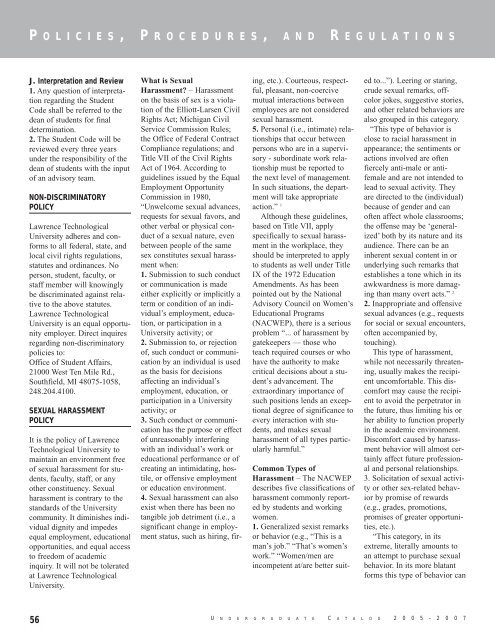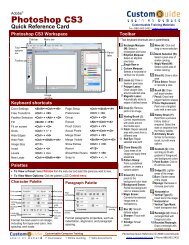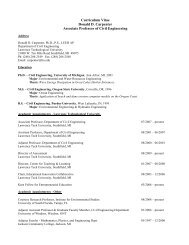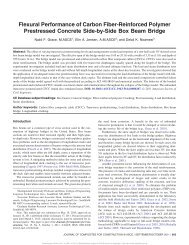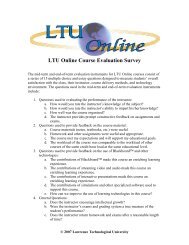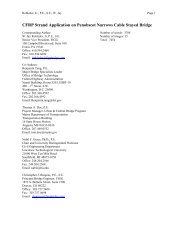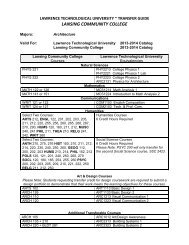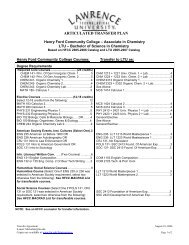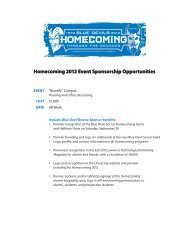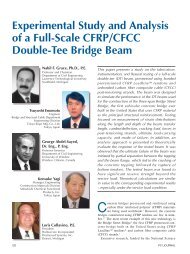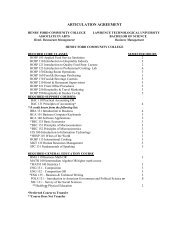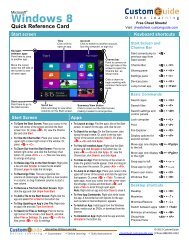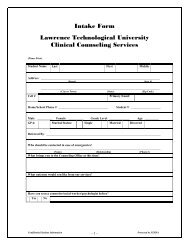to view the 2005-2007 Undergraduate Catalog. - Lawrence ...
to view the 2005-2007 Undergraduate Catalog. - Lawrence ...
to view the 2005-2007 Undergraduate Catalog. - Lawrence ...
You also want an ePaper? Increase the reach of your titles
YUMPU automatically turns print PDFs into web optimized ePapers that Google loves.
P O L I C I E S, P R O C E D U R E S, A N D<br />
R E G U L A T I O N S<br />
J. Interpretation and Re<strong>view</strong><br />
1. Any question of interpretation<br />
regarding <strong>the</strong> Student<br />
Code shall be referred <strong>to</strong> <strong>the</strong><br />
dean of students for final<br />
determination.<br />
2. The Student Code will be<br />
re<strong>view</strong>ed every three years<br />
under <strong>the</strong> responsibility of <strong>the</strong><br />
dean of students with <strong>the</strong> input<br />
of an advisory team.<br />
NON-DISCRIMINATORY<br />
POLICY<br />
<strong>Lawrence</strong> Technological<br />
University adheres and conforms<br />
<strong>to</strong> all federal, state, and<br />
local civil rights regulations,<br />
statutes and ordinances. No<br />
person, student, faculty, or<br />
staff member will knowingly<br />
be discriminated against relative<br />
<strong>to</strong> <strong>the</strong> above statutes.<br />
<strong>Lawrence</strong> Technological<br />
University is an equal opportunity<br />
employer. Direct inquires<br />
regarding non-discrimina<strong>to</strong>ry<br />
policies <strong>to</strong>:<br />
Office of Student Affairs,<br />
21000 West Ten Mile Rd.,<br />
Southfield, MI 48075-1058,<br />
248.204.4100.<br />
SEXUAL HARASSMENT<br />
POLICY<br />
It is <strong>the</strong> policy of <strong>Lawrence</strong><br />
Technological University <strong>to</strong><br />
maintain an environment free<br />
of sexual harassment for students,<br />
faculty, staff, or any<br />
o<strong>the</strong>r constituency. Sexual<br />
harassment is contrary <strong>to</strong> <strong>the</strong><br />
standards of <strong>the</strong> University<br />
community. It diminishes individual<br />
dignity and impedes<br />
equal employment, educational<br />
opportunities, and equal access<br />
<strong>to</strong> freedom of academic<br />
inquiry. It will not be <strong>to</strong>lerated<br />
at <strong>Lawrence</strong> Technological<br />
University.<br />
What is Sexual<br />
Harassment? – Harassment<br />
on <strong>the</strong> basis of sex is a violation<br />
of <strong>the</strong> Elliott-Larsen Civil<br />
Rights Act; Michigan Civil<br />
Service Commission Rules;<br />
<strong>the</strong> Office of Federal Contract<br />
Compliance regulations; and<br />
Title VII of <strong>the</strong> Civil Rights<br />
Act of 1964. According <strong>to</strong><br />
guidelines issued by <strong>the</strong> Equal<br />
Employment Opportunity<br />
Commission in 1980,<br />
“Unwelcome sexual advances,<br />
requests for sexual favors, and<br />
o<strong>the</strong>r verbal or physical conduct<br />
of a sexual nature, even<br />
between people of <strong>the</strong> same<br />
sex constitutes sexual harassment<br />
when:<br />
1. Submission <strong>to</strong> such conduct<br />
or communication is made<br />
ei<strong>the</strong>r explicitly or implicitly a<br />
term or condition of an individual’s<br />
employment, education,<br />
or participation in a<br />
University activity; or<br />
2. Submission <strong>to</strong>, or rejection<br />
of, such conduct or communication<br />
by an individual is used<br />
as <strong>the</strong> basis for decisions<br />
affecting an individual’s<br />
employment, education, or<br />
participation in a University<br />
activity; or<br />
3. Such conduct or communication<br />
has <strong>the</strong> purpose or effect<br />
of unreasonably interfering<br />
with an individual’s work or<br />
educational performance or of<br />
creating an intimidating, hostile,<br />
or offensive employment<br />
or education environment.<br />
4. Sexual harassment can also<br />
exist when <strong>the</strong>re has been no<br />
tangible job detriment (i.e., a<br />
significant change in employment<br />
status, such as hiring, fir-<br />
ing, etc.). Courteous, respectful,<br />
pleasant, non-coercive<br />
mutual interactions between<br />
employees are not considered<br />
sexual harassment.<br />
5. Personal (i.e., intimate) relationships<br />
that occur between<br />
persons who are in a supervisory<br />
- subordinate work relationship<br />
must be reported <strong>to</strong><br />
<strong>the</strong> next level of management.<br />
In such situations, <strong>the</strong> department<br />
will take appropriate<br />
action.” 1<br />
Although <strong>the</strong>se guidelines,<br />
based on Title VII, apply<br />
specifically <strong>to</strong> sexual harassment<br />
in <strong>the</strong> workplace, <strong>the</strong>y<br />
should be interpreted <strong>to</strong> apply<br />
<strong>to</strong> students as well under Title<br />
IX of <strong>the</strong> 1972 Education<br />
Amendments. As has been<br />
pointed out by <strong>the</strong> National<br />
Advisory Council on Women’s<br />
Educational Programs<br />
(NACWEP), <strong>the</strong>re is a serious<br />
problem “... of harassment by<br />
gatekeepers — those who<br />
teach required courses or who<br />
have <strong>the</strong> authority <strong>to</strong> make<br />
critical decisions about a student’s<br />
advancement. The<br />
extraordinary importance of<br />
such positions lends an exceptional<br />
degree of significance <strong>to</strong><br />
every interaction with students,<br />
and makes sexual<br />
harassment of all types particularly<br />
harmful.”<br />
Common Types of<br />
Harassment – The NACWEP<br />
describes five classifications of<br />
harassment commonly reported<br />
by students and working<br />
women.<br />
1. Generalized sexist remarks<br />
or behavior (e.g., “This is a<br />
man’s job.” “That’s women’s<br />
work.” “Women/men are<br />
incompetent at/are better suit-<br />
ed <strong>to</strong>...”). Leering or staring,<br />
crude sexual remarks, offcolor<br />
jokes, suggestive s<strong>to</strong>ries,<br />
and o<strong>the</strong>r related behaviors are<br />
also grouped in this category.<br />
“This type of behavior is<br />
close <strong>to</strong> racial harassment in<br />
appearance; <strong>the</strong> sentiments or<br />
actions involved are often<br />
fiercely anti-male or antifemale<br />
and are not intended <strong>to</strong><br />
lead <strong>to</strong> sexual activity. They<br />
are directed <strong>to</strong> <strong>the</strong> (individual)<br />
because of gender and can<br />
often affect whole classrooms;<br />
<strong>the</strong> offense may be ‘generalized’<br />
both by its nature and its<br />
audience. There can be an<br />
inherent sexual content in or<br />
underlying such remarks that<br />
establishes a <strong>to</strong>ne which in its<br />
awkwardness is more damaging<br />
than many overt acts.” 2<br />
2. Inappropriate and offensive<br />
sexual advances (e.g., requests<br />
for social or sexual encounters,<br />
often accompanied by,<br />
<strong>to</strong>uching).<br />
This type of harassment,<br />
while not necessarily threatening,<br />
usually makes <strong>the</strong> recipient<br />
uncomfortable. This discomfort<br />
may cause <strong>the</strong> recipient<br />
<strong>to</strong> avoid <strong>the</strong> perpetra<strong>to</strong>r in<br />
<strong>the</strong> future, thus limiting his or<br />
her ability <strong>to</strong> function properly<br />
in <strong>the</strong> academic environment.<br />
Discomfort caused by harassment<br />
behavior will almost certainly<br />
affect future professional<br />
and personal relationships.<br />
3. Solicitation of sexual activity<br />
or o<strong>the</strong>r sex-related behavior<br />
by promise of rewards<br />
(e.g., grades, promotions,<br />
promises of greater opportunities,<br />
etc.).<br />
“This category, in its<br />
extreme, literally amounts <strong>to</strong><br />
an attempt <strong>to</strong> purchase sexual<br />
behavior. In its more blatant<br />
forms this type of behavior can<br />
56<br />
U N D E R G R A D U A T E C A T A L O G 2 0 0 5 - 2 0 0 7


